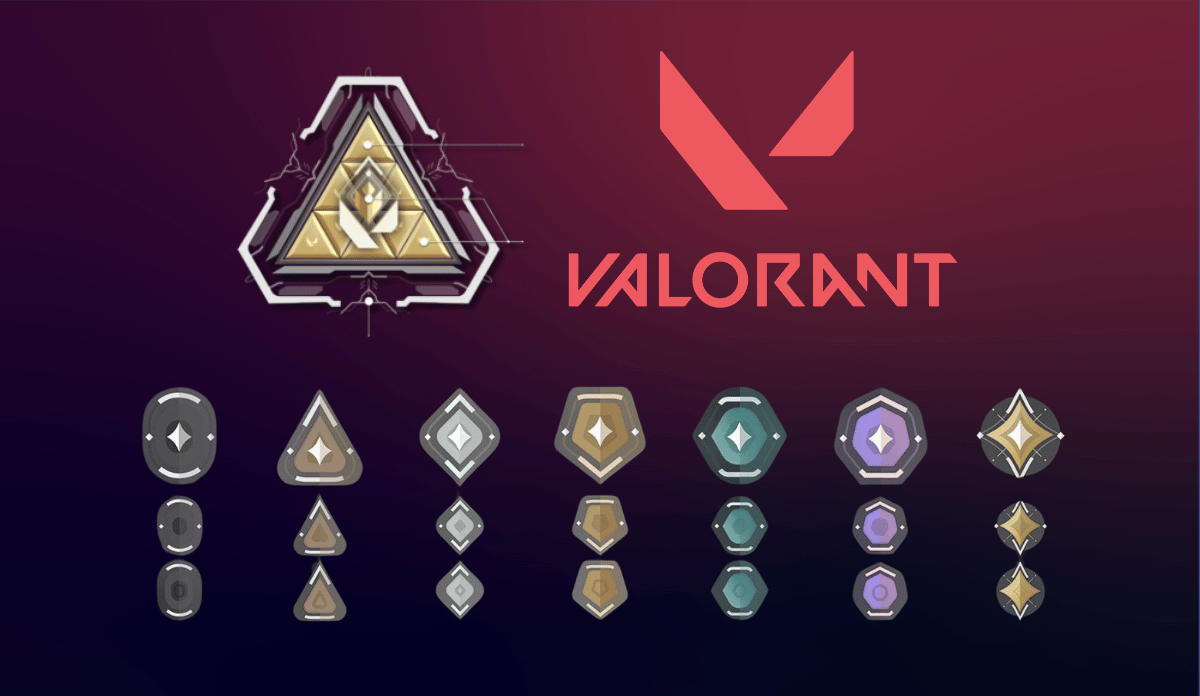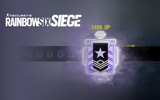Valorant Ranked Mode Explained

Ranking up in Valorant involves a system based on an individual's performance during Ranked matches (which are unlocked by reaching level 20). It's not just about whether you win or lose, it also takes into account how well you played in terms of kills, assists, surviving rounds, etc. You earn Rank Rating (RR) points with each victory and lose RR each time you're defeated. The greater the difference between your performance and the average performance at your rank level, the more points you'll win or lose.
All Valorant Ranks
In Valorant, there are several ranks that indicate a player's proficiency with the game. The ranking system comprises a total of 8 distinct divisions, listed from lowest to highest they include:
- Iron - This is the entry-level stage. Players in this rank are usually beginners who are still learning game mechanics.
- Bronze - These are players who have a basic understanding of the game, but still have a lot of improvement to make.
- Silver - Silver rank players have above-average skills and they begin to incorporate more strategy and teamwork into their play.
- Gold - Players in Gold rank have good game sense and are proficient with several characters.
- Platinum - These players display excellent coordination and a deep knowledge of the game.
- Diamond - Diamond players have mastered multiple characters and have an advanced tactical approach.
- Ascendant - These players are getting ready to play the game at the highest level, but not quite there yet.
- Immortal - Players at this rank are highly skilled and have an in-depth understanding of the game. Competitive play is common in this bracket.
- Radiant - The final rank, Radiant players are the best of the best. These elite players have exceptional skill and a comprehensive understanding of Valorant's intricate strategies.

In order to climb the ranks, you need to win games and earn Rank Rating.
Valorant Rank Rating Explained
Valorant’s Rank Rating or RR is a system employed by Riot Games to measure the skill and performance of its players. Essentially, this numerical value indicates your current standing in your respective rank tier. The RR system is a ranking progression framework that matches players of similar skill sets together, thereby ensuring fair and competitive matches.
The RR values range from 0 to 100 in each rank. Winning matches can get you anywhere from 10 to 50 RR points, depending on your performance. Meanwhile, losing a match can result in a decrease of 10 to 30 RR values.
It's vital to note that the amount of RR you gain or lose isn't solely dependent on winning or losing matches. Valorant considers individual contributions to the game along with the outcome of the round. For instance, if you've performed extraordinarily well during a match, but unfortunately lost, you can still gain a minimal amount of RR.
Upon attaining the maximum RR value in a rank, you'll be up for a promotion match. Win this, and you'll advance to the next rank. Alternatively, if your RR drops to zero, you'll be subjected to a demotion match. If you lose this match, you'll be demoted to the previous rank.
If you're inactive for 14 days in the competitive playlist, you’ll lose 5 RR per day. This decay persists until you fall to the bottom of your current rank or become active.
And then there's this thing called MMR.
Valorant MMR Explained
In Valorant, Match Making Rating (MMR) is a hidden statistic that impacts who you are paired against and which teammates you are assigned. MMR is not the same as your visible rank; while your rank reflects your performance in relation to other players, your MMR represents your individual skill level.
The way Riot Games calculates MMR is quite complicated. It takes into account multiple factors such as your win-loss ratio, your consistency in wins, and the difference in MMR between you and your opponents. Winning a match puts a positive influence on your MMR while losing a match affects it negatively. Also, the number of Rank Rating points you gain or lose after a match depends on the MMR difference between you and your opponent. Winning against a team with a higher MMR will earn you more points, while a loss would lead to a lesser rating decrease as compared to a match against a team with a lower MMR.
An important aspect to understand is that your MMR and your visible rank aren’t the same. You could be an Iron rank but still be matched against Silver players if your MMR is high enough. Essentially, the MMR system emphasizes consistent good play. For instance, if you're consistently top fragging and leading your team to victory even in a lower rank, you may be bumping up your MMR consistently, which might get you placed against higher-ranked opponents, which in turn gives you the chance to accumulate more rank rating.
Rank Distribution in Valorant
Generally, the player distribution spreads across the various ranks in Valorant as seen in this chart:

What Ranks can Play Together in Valorant?
Five Stack
- If you have a full team of five friends below Ascendant, you can play together, but your ranks will impact your rank rating (RR) points and penalties.
- If all are Diamond 2 or lower, RR depends on the group's ranked disparity.
- If at least one is Diamond 3 or higher, there's a minimum 50% RR reduction, increasing up to 90% based on rank disparity.
- Having a Radiant player results in a minimum 75% RR reduction, with a potential 90% reduction when playing with friends below Radiant.
Four Stack
Playing with a four-stack in ranked matchmaking is no longer allowed to ensure a balanced experience. This prevents potential issues with the 5th solo queue player.
Three or Two Stack
Playing with one or two friends has specific rank restrictions:
- Iron and Bronze can play with up to Silver.
- Silver can play with up to Gold.
- Gold can play with up to Platinum.
- Players above Ascendant can only invite Platinum ranks or higher to their party.
- Immortal or higher ranks can only play solo, duo, or with a full five-stack.
Tracking your Rank and Progress
Valorant offers ways for players to keep track of their progress. Your overall rank and current RR can be seen on your profile page, while detailed performance metrics and game-by-game statistics are available on match history pages. These tools can give you a better understanding of what you need to work on to improve your rank.
There are also several excellent homepages where you can track your Valorant rank, MMR (Matchmaking Rating), and match history for free. These have been specifically designed to help players learn and evaluate their gameplay performance, ultimately leading to a consistent improvement in the game.
Tracker Network (tracker.gg)
This website offers a comprehensive tracking system for various games, including Valorant. You can search your Riot ID to view your current rank, MMR, match history, and much more. There's also a leaderboard to inspire competitive gaming.
Mobalytics (mobalytics.gg)
Not just for Valorant, but Mobalytics is also for those who play League of Legends. It provides a unique GPI (Gameplay Performance Index) score that evaluates your overall performance across several parameters. A brief summary of your gameplay and areas to improve upon are impressive features of this web tracking platform.
OP.GG (op.gg)
OP.GG offers a simple yet effective way to check your Valorant statistics, such as your win rate, average K/D/A, and more. One unique feature of this website is its champion analytics, which displays data on the most effective characters and strategies, helping you decide which agent to pick.
Blitz.gg (blitz.gg)
This platform offers a downloadable app to track your games automatically. Blitz.gg is famous for presenting an in-depth analysis of your strengths, weaknesses, and suggesting tips to improve.

What are Valorant Acts and Episodes?
It's basically seasons. An Episode is about six months long, consisting of three Acts that are usually two months each. This is to keep the game interesting with new content and challenges.
Every Episode ushers in extensive changes, like new agents or gameplay adjustments, setting an overall theme for the upcoming acts.
Every Act introduces smaller changes like agent tweaks, map modifications, or new skins. Plus, each Act soft resets player rankings, providing a chance to improve ranks and maintain a competitive gameplay environment.
Here's how it works: Your rank doesn't reset entirely with each act, but rather, your performance in the previous Act influences your placement matches at the start of the next. Also, your highest achieved rank during an act will be recorded in the form of an Act Rank badge that displays on your player card.
Rewards by Ranking Up
In Valorant, as you climb higher in the ranks, you'll have the opportunity to unlock a variety of exciting rewards. Included in these are the coveted rank-inspired cosmetics, which undoubtedly add style to your gameplay. This is where perseverance pays off. By reaching specific rank milestones, you'll be able to unlock a variety of rewards that reflect your achievements.
One of the most sought-after rewards that players can unlock are the Act Rank Badges. These classify as episodal awards that reflect the highest ranked matches won by the player during each Valorant Act. These badges vary considerably in color and design based on the rank that you've accomplished within the Act. It's noteworthy that you only get an Act Rank Badge if you manage to win at least nine matches in that respective Rank during the Act.
Tips and Tricks to Rank Up in Valorant
Improving your rank in Valorant can be a challenging task, especially for players new to tactical FPS games. The secret lies not just in practice, but also in understanding the dynamics of the game and leveraging effective strategies. Here are a few tips that can help you climb up the Valorant ranking system:
- Master the mechanics: The first step to getting better at Valorant is understanding its mechanics. Practice your aim, learn about weapon recoils, map layouts, and use the training mode to improve your overall understanding and skills.
- Use your Agent's abilities wisely: Every agent in Valorant has unique abilities. Learning when and where to use these abilities can be a game-changer. Strategize your skill usage effectively to assist your team and outmaneuver your rivals.
- Choose the right agent: Different agents excel at different scenarios. It's vital to select an agent that complements your playstyle and the demands of the current match. You should feel comfortable with your agent's abilities and should be able to implement them effectively in the game.
- Communication is key: Valorant is a team-oriented game, and constant communication with your team is crucial. Inform your team of enemy positions, your current moves, and collaborate on strategies.
- Play with a team: Whilst it's possible to climb ranks in solo queue, playing with a coordinated team gives you a slight edge. You can plan strategies and execute game plans more effectively.










